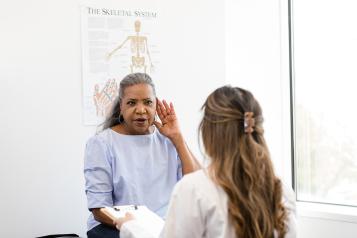What is Long Covid?
Long Covid usually presents with clusters of symptoms, often overlapping, which can fluctuate and change over time and can affect any system in the body.

This content comes from our 5 May online event and presents information available about Long Covid at that time. We have also published Questions and Answers on Long Covid from the same event.
Visit the North Central London NHS website for information and resources related to Long Covid.
What is Long Covid?
- Long Covid, which you may also see referred to as Post-Covid Syndrome, describes symptoms that develop during or after an infection consistent with COVID‑19 that continue for more than 12 weeks, and are not explained by an alternative diagnosis.
- People with Long Covid haven’t necessarily been in hospital or had a positive COVID-19 test, but most will remember a Covid-like illness that triggered their symptoms.
- The severity of Long Covid doesn’t relate to the severity of your initial Covid infection. There is a massive range of severity. Non-hospital patients can be just as unwell as patients who were hospitalised.
- Long Covid usually presents with clusters of symptoms, often overlapping, which can fluctuate and change over time and can affect any system in the body.
Symptoms
- Most patients describe breathlessness and fatigue but other common symptoms are muscle aches, chest pain, cough, difficulty concentrating (“brain fog”), and many others. People can feel worse after exercise. For example, a Long Covid sufferer might feel bad for two days after taking their dog for a walk.
- There can be inflammation of the heart, and lung effects (although lung scarring is less common in non-hospitalised patients).
- One-third of patients have abnormal breathing patterns.
- Another symptom is tingling in the arms and legs. Covid can affect nervous tissue.
- The body’s autonomic functions can be affected (heart rate, variance in blood pressure causing dizziness).
- Long Covid is thought to be the effect of the virus on different parts of the body. It’s a very complicated picture and a fluctuating condition. The virus can affect so many different parts of the body, and no one patient presents in exactly the same way as another. This makes understanding the illness and developing treatments challenging.
- Regardless of your individual symptoms you should be steadily getting better over time.
What should I do if I think I have Long Covid?
- If you think you might have Long Covid speak to your GP. They can refer you to appropriate support.
- GPs have been given information to help them assess and refer patients to services if needed. The assessment tool includes a questionnaire you will be asked to complete. Because there are so many possible symptoms a GP wouldn’t have time to ask about all of them during an appointment. The questionnaire makes a GP assessment for Long Covid practical and helps ensure that relevant symptoms don’t get missed.
- Self-care is also very important. www.yourcovidrecovery.nhs.uk is a good resource. Recovery Colleges are running webinars, and voluntary sector organisations are offering services, such as yoga, suitable for people managing symptoms.
Long Covid in North Central London
- It is thought that between 10,000 and 14,000 people in the North Central London region (this covers Barnet, Camden, Enfield, Haringey, and Islington) have Post-Covid symptoms but it is not known how severe these are.
- 47 GP practices out of the 201 in North Central London have not referred any patients with Long Covid. (GPs have been given information to help them assess and refer patients to services if needed, but Long Covid is a new syndrome so there are challenges. If you feel that something has been missed you should go back to your doctor.)
- Community-based services including physiotherapy, OT (occupational therapy), and psychological support are also available to support recovery from Long Covid.
- UCLH provides the Long Covid Clinic for our area. You might get referred here if you have low oxygen levels, chest pain, or blackouts. There are lots of specialists involved as symptoms are so diverse. Additional scans are available there, for example, CT scans, heart scans, brain and spine scans, and extra blood tests.
More information and resources
Health providers in North Central London have gathered together resources to support people with Post-Covid Syndrome (Long Covid).


